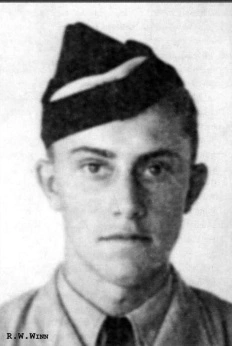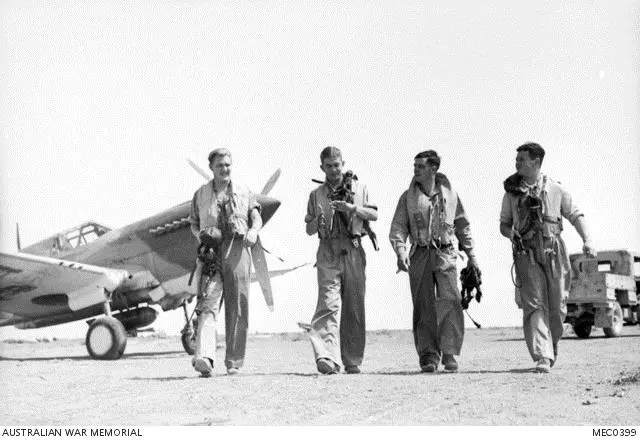PLTOFF Richard William Winn 403776



| Squadron/s | 450 SQN 457 SQN |
| Rank On Discharge/Death | Pilot Officer (PLTOFF) |
| Nickname | Dick |
| Mustering / Specialisation | Pilot |
| Date of Death | 29 Sep 2007 |
| Contributing Author/s | Phil Listeman Updated Vince Conant The Spitfire Association (Other Credits within page) |
Posted from No 58 OTU, English born Australian.
Volunteered for overseas service and sent to the Middle East. With No. 450 Squadron (RAAF) from August 1942 until hit by ground fire during a low level attack on the 14th of January 1943 and shot down, and made a PoW until the end of the war.
A dedicated and vital member of the "Desert Harrassers."
Dick Winn, 1921-2007 … fighter pilot who followed his father into medicine.
His neighbours knew Dick Winn as the polite, elderly widower who walked his dog Robbie around the streets of St Ives most evenings. They had heard he was a retired medico of some description. What they didn't know was that behind the courtesy and mild manners, was a life of derring-do and achievement few could match.
Winn, who was head choirboy at school, went on to become a fighter pilot, prisoner of war, ophthalmic surgeon, yachtsman, hang-glider exponent and game fisherman.
Richard William Winn, who has died at 86, was born into the family that ran the chain of Winns Ltd stores in Sydney, although Dick's father, Roy Coupland Winn, thought a career in haberdashery a little on the prosaic side and studied medicine. He graduated in time to go to Gallipoli as medical officer to the 14th Battalion in World War I and then with the 4th Field Ambulance in France.
He had his right foot blown off in the Battle of Messines and won a Military Cross. He met Betty Browne, who worked in a munitions factory, while recovering in hospital and they married. Shellshock led Roy into psychoanalysis after the war; he corresponded with Sigmund Freud and became a leader in the field in Australia.
Roy Winn's heroic exploits inspired young Dick, especially as the lad had been blessed, or cursed, with a rebellious streak fuelled by frustration with dyslexia. Despite this handicap Dick sang in the choir at St Michael's, Vaucluse, and emerged from Cranbrook School with a sufficiently decent pass mark to gain entry to Sydney University. He was studying engineering when he became eligible to join up, only a few months after the outbreak of World War II.
Winn, who had already started flying lessons, thought he would walk into the air force. The interviewing officer thought otherwise: engineers, even student aeronautical engineers, were in a reserved occupation. Quick-thinking Dick announced he had dropped out yesterday. He got in.
Winn bought his mother a white gold brooch, in the shape of the RAAF wings badge, before leaving for war and she wore it with pride. He admitted later that, as a young man, he had not shown his mother affection: "I have been ashamed of this all my life." She died while he was away.
Winn trained in Canada, topped his course in practical flying and was granted his wish to pilot fighters - Spitfires and Kittyhawks - from Britain. He flew the warplanes with an enthusiasm manifested in a rare departure from his natural taciturnity: diving a Spitfire at 500 mph, he said, was a thrill beyond all thrills, a Boy's Own adventure come to life.
From aerobatics over the glens of Scotland he was posted to 450 Squadron in the Western Desert, around El Alamein, supporting Montgomery's push against Rommel's Afrika Corps. He flew 92 missions, engaging in dogfights, shooting down the odd Italian Macchi and German Messerschmitt and strafing enemy emplacements. On the 92nd, a low-level strafing run, he was hit by ground fire. His engine seized and he was too low to bale out, but managed a crash-landing. Italian soldiers flushed him out of sandhills and handed him over to the Germans.
Two years and four months followed in two stalags, one in Poland and one in Germany, with long periods of interrogation and solitary confinement.
There were bright moments. Winn treasured an association with Eric Williams, who wrote The Wooden Horse, which was about attempts to escape by tunnelling out of the camps. Vaulting the horse inspired him to fashion a wooden trolley to aid survival during a long, forced march across half of Germany. The gruelling march ended happily; as the POWs struggled into the city of Lubeck, they were liberated by British troops.
After the war, Winn forsook engineering to follow his father into medicine and a career as an eye specialist. Studying to qualify as an ophthalmic surgeon, he was required to remove eyes from cadavers and replace them with prostheses. He wondered about future archaeologists unearthing skeletons with glass eyes.
While building up successful practices in Macquarie Street, Bankstown and Gordon, he found time to indulge his passion for sailing and crafted by hand at least one of the boats, Salmo, he sailed on Pittwater. Winn was good at most sports, especially swimming, gaining his bronze medallion at Palm Beach Surf Club. He earned a blue for shooting and acquitted himself well in university rugby.
In 1951, he married Helen Parkes, a nurse and grand-daughter of Sir Henry Parkes, at St Phillip's, Church Hill. They had three children, Margaret Jane, Roger Andrew and Philippa Helen.
His latter years were marred by indifferent health, the death of his beloved Helen six months after they moved to their retirement home in St Ives, and the death last year of his youngest daughter, Philippa, from breast cancer. He battled on, living alone, self-sufficient, cheerful and friendly until dying peacefully in his sleep at home. Winn's simple modesty meant he had volunteered little about his remarkable life, but he had written his memoirs for his grandchildren.
Dick Winn is survived by his daughter Margaret, son Roger, sons-in-law Andrew Dix and John Arentz, daughter-in-law Beverly Winn and three grandchildren. A sister, Betty, predeceased him.
© Bob Johnson - Sydney Morning Herald – September 2007
This is Part 2 of the Memoirs of Pilot Officer Richard (Dick) Winn
23 January 1943:
Tripoli Libya fell to our 8th Army. Our Squadron, 450 RAAF, moved to Castle Bonito Aerodrome, Tripoli's aerodrome. On the first operation from this place I was asked to replace P/O George Norton, who was told to go into Tripoli and see if he could secure some beer for our mess. This would be my 92nd sortie and my last!
24 January 1943:
We took off to bomb and strafe Ben Gardane LG and strafe the retreating motor transport etc., on the coast road to the east of Ben Gardane. This was when I was hit, you can hear the "ping" noise I had been hit at other times, I did not feel it was in a vital place but climbed up to reform our formation. A JU 88 flew past going west – I engaged but after one burst my guns stopped, probably out of ammunition. On turning west I noticed the engine temperature off the clock – glycol fumed in the cockpit, engine seized, too low to bale out – a lot of flak was coming up, did a number of gyrations while gliding down to a crash land with wheels up. I was lucky there was a small clear space in the middle of sand hills. It was a bumpy landing and shook me up. I got out and went off in a south east direction in the sand. My tracks were obvious in hindsight I should have gone west or south west. After about 200 metres I saw an Arab with a camel crossing my intended track so I stopped and lay down behind a camel thorn bush, waiting for him to go. The Arabs in this area were mostly hostile to the Allies.
While there curled up, three Italian soldiers came over the hill behind me, one with a light machine gun, one with a rifle, and a NCO waving his pistol. I was unarmed – I carried a water bottle rather than a pistol. I put my hands up – the sergeant took my watch and said, "Companion". I thought he wanted to give himself and party up and become POWs so I pointed in the direction of our lines to the south east – so we four started walking south east. I thought this is terrific, we went for some distance – he stopped and said "Companion" again. I pointed again, off we went again – after a few of these he got annoyed and we went back to my crashed plane. It was then I realised he thought I was not the only one in the plane but had a companion with me. He knew a little French and my French was worse. When we got back to my plane OK-B they had just started to set it alight.
